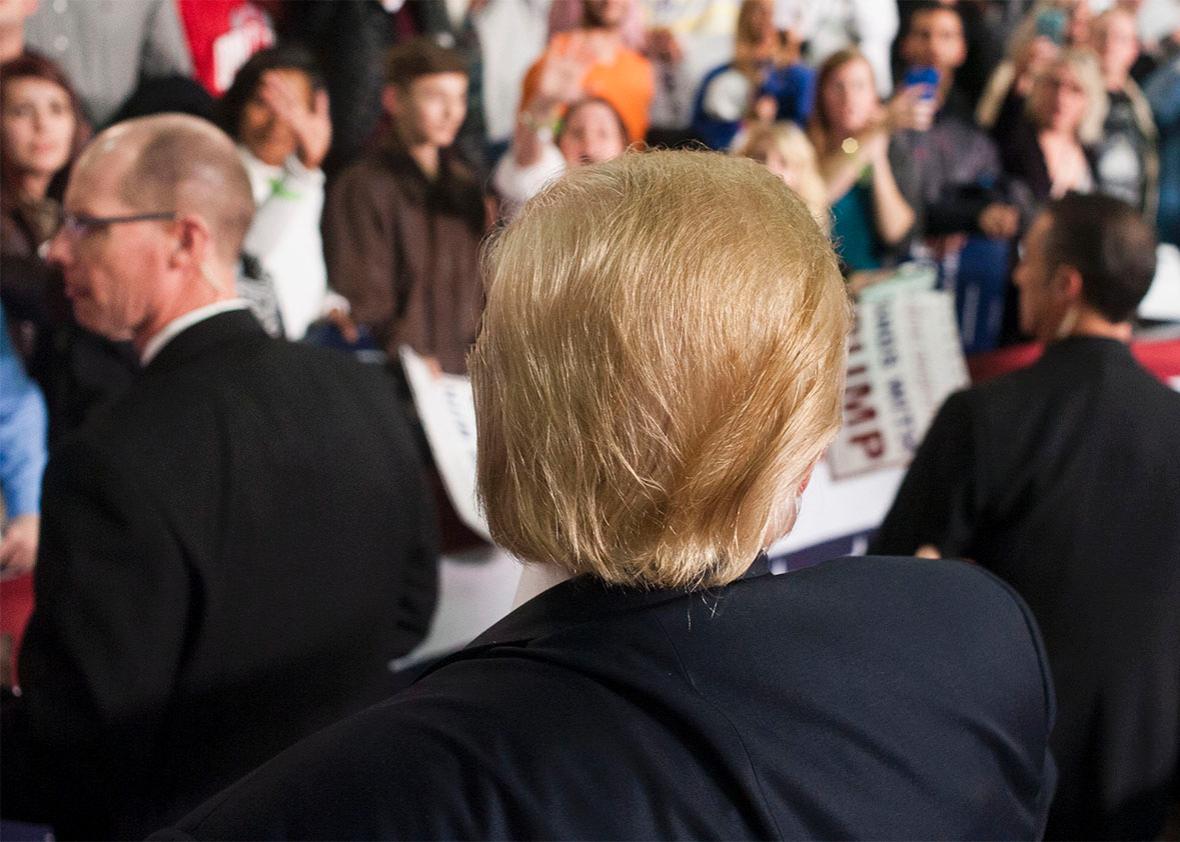On Monday, the Man Who Will Never Be President—but who is the Republican Party’s front-runner in early polls—proposed banning all Muslims from entering the United States, at least until he or someone else “can figure out what the hell is going on” with jihadi terrorism. It’s a proposal so nasty, so shortsighted, and so breathtakingly antithetical to the very core of American values that it demands a response and has elicited one from pretty much everyone.
Yet that, by every indication, is exactly what the Man Who Will Never Be President wants. He craves attention, and he’ll get it however he can, fair or foul—by any means or media necessary. The inevitable snarky Tweets, cable news quick takes, outrageous op-eds, Facebook fistfights, and denunciations in the pages of established daily newspapers will seep together into a great, undifferentiated Narcissus’ pool, reflecting back a scowl and a bad comb-over. The evidence suggests there is little, perhaps nothing of substance behind the attention-seeking—no robust campaign infrastructure, no ideologically coherent set of values, and, it’s achingly clear by now, no plan for running the country. But for the Man Who Will Never Be President, the ephemeral but deafening media maelstrom is the thing—his Super Bowl, his Moby Dick, his presidency. It is what he truly cares about, in contrast to the messy, tiring, and inevitably compromised business of actually governing.
So consider this modest proposal for restoring a modicum of civility to our national discourse: Everyday readers, viewers, and social media users sick of this silliness should stop using his name. Since he’s already currently trending on Facebook and Twitter (again), go ahead and get out your last “Trump” now. (That’s mine.) While you’re at it, consider taking the opportunity to thank your Muslim-American friends, colleagues, and neighbors for their grace during this trying time. If you’re on social media, give a shoutout to our Muslim-American teachers, nurses, engineers, firefighters, police officers, and National Guard reservists for their service. And then moving forward, when you dash off that Facebook post, email, or tweet about the latest zany pronouncement, call the man behind it anything but his name. It could be Ooompa Loompa, or Bossolini. I’ll simply call him the Man Who Will Never Be President.
This isn’t really about him, of course. What actually pleases the Man Who Will Never Be President is important only insofar as it helps determine how to remove him from the center of our impoverished public dialogue. Each morning, this great and powerful nation awakes to a host of competing priorities, from education, to infrastructure, to ISIS. The issues we collectively seek to elevate help frame our own perception of our country, and they direct the energies of policymakers with sharply limited bandwidth in very specific directions.
They also affect how the rest of the world sees America, which remains an exemplar nation that sets the international tone. In my work, I focus on China—particularly the tightly controlled Chinese media landscape, and the way in which American and Chinese media intersect, informing perceptions within and between the world’s two most powerful countries and biggest geopolitical rivals. As a China watcher, I can only imagine the glee leaders in Beijing’s top leadership must feel every time the United States convulses in yet another media cycle driven by demagoguery and fear.
Fortunately, America’s national dialogue is no longer in thrall to a few gatekeepers. Modern media is immensely more fragmented and participatory than ever before, driven by social platforms and often governed by the demand signals that they send. What readers and social media users say and do can shape the news cycle in meaningful ways. To some extent, then, we construct our daily reality one like and retweet at a time. That means we can choose a better and more fruitful direction.
None of this means that changing perceptions will upend the very troubling reality from which the Man Who Will Never Be President’s campaign has sprung. His popularity is, to a large extent, the manifestation of the pain of many Americans scared for the future—not just for their ability to keep themselves and their families safe, but for their chance to get a fair deal in an increasingly unequal economy whose rules seem to be authored in corporate boardrooms. That anxiety is genuine, often rooted in economic reality, and it deserves to be acknowledged.
But it would be far better served by a dialogue about real policy solutions, one untethered from a poor spokesman too absorbed in his own image to honor his supporters’ needs.
